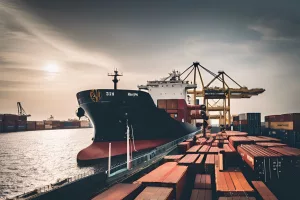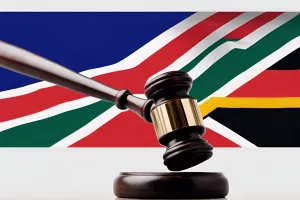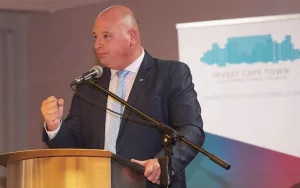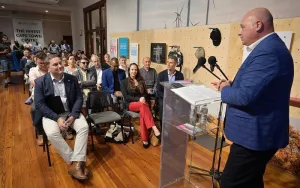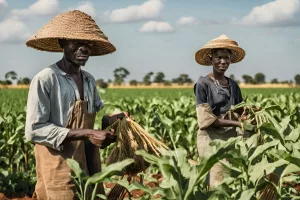Cape Town’s Development Charges Fund is a pioneering strategy aimed at enhancing affordable housing in lowerincome localities by backing microdevelopers financially. The fund offers subsidies for qualifying microdevelopers on firstcomefirstserve grounds and is anticipated to boost investment in the rental market, subsequently creating more affordable housing options within Cape Town. The initiative is a comprehensive economic package designed to encourage investment in targeted areas, with the expectation of generating employment opportunities, amenities, and economic prosperity for residents.
Dr. Nobuhle Nkabane emphasized the importance of beneficiation, boosting exploration, and involving women and youth in the extraction and exploitation of natural resources to revolutionize the African mining industry at the thirtieth session of the Investing in African Mining Indaba. Africa has substantial reserves of various minerals and petroleum resources, making it a leader in ecofriendly industries. However, underdevelopment persists due to the “pittoport” methodology, and the solution is to process resources locally to secure benefits for Africa.
The African mining industry has shown its resilience despite facing challenges like rising energy costs and power cuts. The sector has made a noteworthy contribution to the nation’s GDP in 2023, thanks to investments in new and existing mining operations. The Department of Mineral Resources and Energy is overseeing the execution of R400 billion in mining projects promised at several investment seminars. The 30th Investing in African Mining Indaba held in Cape Town had a central theme of “Seizing the power of constructive disruption: A daring new era for African mining,” which embodies a determination to transform the mining sector and make it a significant global competitor.
FlySafair has launched a new flight route between Cape Town and Kruger National Park, promising to bridge the gap between two of South Africa’s top destinations. Prices for a oneway ticket start at R1851, making it an affordable and convenient option for domestic and international tourism. This innovative step seeks to encourage interprovincial exploration and inclusive growth in the tourism industry while injecting new dynamism into South Africa’s tourism sector.
The 30th Investing in African Mining Indaba in Cape Town honored the late Namibian President and discussed opportunities and challenges in the African mining sector. South Africa’s mining industry has undergone transformative changes over the past three decades, with a shift from 2% to 39% black ownership. However, the sector faces challenges such as geopolitical conflict, energy costs, and illegal mining. President Ramaphosa proposed goals to boost the sector’s competitiveness and ensure a sustainable future. Initiatives such as the Electricity Action Plan and Just Energy Transition Investment Plan provide a roadmap for progress.
Prince Harry and Meghan Markle have founded media production company Archewell Productions with a focus on creating impactful content that “educates and also provides hope”. They have partnered with Netflix on several unscripted projects, a scripted series, and a feature film. Their collaborations with Netflix showcase their commitment to generating diverse content and their dedication to social causes, including highlighting the Invictus Games, a sporting event founded by Prince Harry for injured veterans. The couple’s transition from royal life to media production highlights their resilience and adaptability, as they shape the global entertainment landscape.
South Africa’s ports are facing delays that are costing the economy R98 million per day, causing hindrances in import/export activities and stunting growth in various economic sectors. Clothing manufacturers and retailers are struggling to import necessary products and raw materials, while consumers face inflated prices for everyday essentials. Urging for reforms and private sector involvement, rectifying the situation could create job opportunities, bolster export volumes and significantly improve South Africa’s position in the global marketplace. Despite these challenges, there is hope for the future if appropriate policies and reforms are put into place.
FlySafair has announced a new route connecting Cape Town and Kruger National Park, catering to the increasing international tourism numbers in Cape Town. The Boeing 737800 will operate flights every Tuesday and Saturday from April 2024, with a oneway ticket fare starting at R1 851. The new route offers a costeffective option for tourists to experience the diverse natural and cultural heritage of South Africa.
The Deputy Public Protector position is a crucial role in the South African justice system, responsible for upholding fairness and justice. The position opened up for applications and nominations last year, and South African citizens who meet the necessary requirements and qualifications are invited to apply or be nominated. This is a rare opportunity for citizens to actively participate in shaping their justice system and society.
The backlog in South Africa’s visa system is hindering economic growth and job creation, and President Cyril Ramaphosa must focus on revamping the system to streamline and simplify the process. This could empower companies and industry players to enhance skills development and elevate employment prospects throughout the country. In addition to visa reform, improvements at the Port of Cape Town and duty reductions in the clothing industry are also important to stimulate economic growth and job creation. Overall, decisive action, a clear vision, and a steadfast commitment to future growth are necessary for South Africa to reach its true potential.
The Welisizwe Rural Bridges Programme is a government initiative aiming to upgrade safety and wellbeing and promote economic growth in rural communities by constructing additional bridges. The launch event was attended by distinguished officials and locals and marked progress and hope for historically underrepresented communities across South Africa. The programme has already provided job opportunities and improved access to healthcare, schools, and workplaces. It stands as a symbol of the government’s commitment to bridge gaps and build a South Africa that future generations can take pride in.
The Invest Cape Town Centre is located in the heart of Cape Town and is a versatile hub designed to foster interaction and collaboration, champion local creators, and position Cape Town as a leading African business hub. The center showcases a variety of products born out of Cape creativity and hosts initiatives aimed at appealing to investors from home and abroad. It is a warm invitation for businesses to grab the opportunities at hand and benefit from the tangible support on offer. The center is part of a wider scheme by the city to back businesses by proffering assistance mechanisms for diversesized businesses or those in burgeoning industries, positioning Cape Town for growth as a leading African business hub.
South Africa has taken a groundbreaking step towards Africa’s economic prosperity by initiating preferential trade under the African Continental Free Trade Area (AfCFTA), which aims to boost intracontinental commerce and industrialization in Africa. The transformative potential of AfCFTA lies in its capability to expedite the growth of regional and local value chains, offering investors access to a rapidly expanding continental GDP and a population of 1.7 billion people. The AfCFTA intends to exploit this continental market to boost agricultural development and food security while ensuring that young people and womenled firms are active in export markets.
A Single Contact for All Urban Development Inquiries: A Groundbreaking Progress in City Management
Cape Town has launched a universal phone number, 021 401 4702, for all urban development inquiries, replacing a confusing array of numbers for eight planning district offices. The contact hub, with skilled agents, operates from Monday to Friday, 08:00 to 16:00, and acts as a link between residents and officials, escalating issues requiring specialist attention. The initiative, which transcends geographical boundaries, signifies the city’s commitment to enhancing citizen experiences, creating a collaborative atmosphere between the city and residents, and setting new standards in urban management.
Urbanites play a crucial role in driving the development of their cities through their civic payments. This mutually beneficial partnership is based on trust, with every penny paid towards city services infusing vitality into the city and allowing it to continue to grow. City officials are constantly working to make payment processes more userfriendly, with technological advancements like QR codes on municipal bills and online booking systems for services. This dedication to progress and innovation is reciprocated by the residents’ readiness to invest in their city.
A judge in Delaware has overturned Tesla CEO Elon Musk’s $56 billion compensation plan, which was deemed “inordinately exorbitant.” The ruling is a legal milestone for shareholders calling for limits on executive pay and could have ramifications for executive compensation in the US. Musk seemed unaffected by the ruling, taking to X, a platform previously known as Twitter, to share a piece of advice for budding entrepreneurs: “Never incorporate your company in the state of Delaware.”







